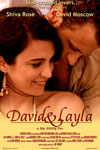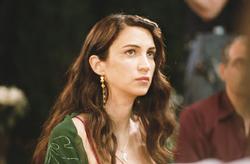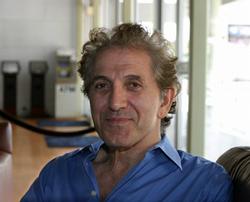

"People in the Islamic world have to grow up and not take everything so seriously."
Sunday, September 9, 2007

In New York, David, a Jewish American TV host of "Sex and Happiness", falls in lust with sensual Layla, a Kurdish immigrant. Faced with deportation, Layla must make a crucial life decision: to marry the exciting, witty Jewish David or conservative Muslim Dr. Ahmed? David's lust turns to love as he discovers that behind the mysterious Layla is a strong, intelligent, sensitive human being with an ancient culture that parallels David's own Jewish tradition--spice, music, dance and humor, despite unspeakable tragedy. David and Layla follow their hearts only to open up a whole new set of complications: who will convert and how will this young couple shake off their "baggage" of their families' prejudices and the background of hate, war and death flashed daily in the Media? David & Layla take the plunge: they wed, obliging the two families to discover that they share more in basic humanity than they had imagined; finding that love is wise and hatred is foolish.
Director Jay (Jalal) Jonroy's heartfelt and personal David & Layla is one of those films that earns a recommendation not so much on its entertainment merits (it is, after all, Jonroy's first ever writing/directing/ producing effort) but because of its unique cross-cultural perspective and revolutionary message of hope set against a background of seemingly insurmountable obstacles. It's a story based upon the experiences of a very real married couple who are currently living in Paris. (France, not Texas.)
David (David Moscow) roams the streets of Brooklyn with a microphone and a videographer assistant in tow, accosting passers-by with off-the-wall questions about their romantic lives: something to do with spices spicing up relationships. He airs his interview footage on local cable access and thus achieves a niche celebrity. David describes himself as an agnostic, but he's functionally a non-practicing Jew (with practicing Jewish parents).
Layla (Shiva Rose), a Kurdish Muslim refugee, is living with New York relatives on the terms of a temporary visa, which - as agents of the USCIS come to her family's house to explain - is expiring. Bottom line: she has four weeks to either marry a U.S. citizen (and thereby establish permanent residency) or leave the country, which for her is not a viable option.
So when this exotic beauty bumps into David during one of his street interview sessions, and he develops an immediate letch for her, it seems to us as spectators that we've discovered a pretty straightforward resolution to the film's dramatic problem. However...
In the first place, Layla is no pushover. It takes a great deal of street pursuit (on several accidental-encounter occasions) before she will even acknowledge David's presence as an acquaintance, much less a potential romantic suitor. It's not as though she's immune to romance: Layla loves to dance, and sometimes breaks into spontaneous bouts of whirling on the street corner or in a city park; she dreams of her Kurdish homeland, sometimes envisioning its canyons and mountains superimposed on the sides of urban cityscapes. She is full of the joy of life, and yet there's a dark side to her personal history. David - lustily determined - eventually penetrates her social armor and the two begin discussing a possible future.
 |
| Shiva Rose as Layla |
Which is where the real problems come into play. Because - as mentioned - David's background is Jewish, and Layla is Muslim.
This film does a better job than any I've seen at extrapolating upon the real and substantial barriers existing between two cultures, and it does so with only a minimal amount of preachiness. (When the couple spar verbally regarding cultural contributions to world societies - his Jewish bagels vs. her Muslim coffee - it seems a bit contrived; and when an ordinary musician explains to a learned Imam that one of the preferred translations of the Koran was done by a Jewish scholar in order to sway him to accept the conversion of a Jew professing to the Muslim faith, it erects a rather tallish obstacle to believability.) These soul mates can't simply decide to marry and drop over to the Justice of the Peace - they have family expectations to deal with, and thousands of years of tradition to overcome. Compromise on all sides turns out to be the only solution.
The fact that David decides - for love - to convert to Islam is only one of the elements sure to make this film controversial to traditionalists on both sides of the Muslim/Jewish fence. (Another is that it appears to be saying that one's religious holdings are secondary to one's functionality in the real world: radical stuff, Jay!)
Callie Throne (familiar to Rescue Me devotees) is the only "name" actor in the movie, portraying David's not-quite-fully-enamored fiancee; the rest of the players seem comfortable in their roles, with Mr. Moscow occasionally coming across as something of a Woody Allen-style nebbish. Ms. Rose is a visual delight, with a charming smile and confident manner that should win her more starring roles.
HARSH... BUT HARD TO DENY: "We all live in cages." - Howar (Joseph Kamal), Layla's musical accompanist and David's sponsor in his conversion to Islam, referring to cultural and familial ties
GOING UP!: "When the cock rises, the brain flies away." - David's father, Mel (Peter Van Wagner)
* * * * * * * *
 |
| Jay Jonroy at the Angelika |
Jay Jonroy, touring in connection with the opening of his film David & Layla, sat down with a small group of journalists last Friday (Sept. 7) in the lobby of the Angelika Dallas to discuss his experiences making the movie and screening it around the world. He currently lives in New York, holding dual British and American citizenship; he was born in Kurdistan (Iraq), and has been personally affected by the horrors of Saddam Hussein's genocidal campaign against Kurds, in that the remains of both his missing brother and his brother-in-law turned up among the occupants of mass graves.
Mr. Jonroy is a charming, well-spoken and thoughtful; from his comments he's clearly no stranger to the history of cinema, both classical and contemporary. He also possesses a well-developed sense of humor.
It would be inaccurate to call our hour-long meeting an interview, because Mr. Jonroy takes off from a given question and expounds at length, eventually plunging into seas of subject matter unperceived by the questioner. So I'm calling it a commentary, and following are the highlights of what Jay had to say:
"The first thing I learn about film is that life is stranger than fiction. You can not put real life on screen - it is not believable."
"I wear a beret and I ride a bike with French bread and wine in Central Park."
"So I meet these characters. And they didn't know I was from Middle East... I don't look like a stereotypical Middle Eastern let alone a Muslim, and this guy says (effecting an accent) 'they're breeding like rats.' Again, rats is too extreme on screen - so I change to rabbits."
"What we say behind each others' backs is often not printable. It's humanity."
"The majority of the Muslim men in the world - they don't want to admit that the women - they dance and drink wine."
"I think that Fox TV and Al Jazeera are responsible for (stereotyping Muslims as humorless disciplinarians and extremists/terrorists)."
"This film is the first time on screen a Muslim woman dares to be independent: to dance, to drink wine and to decide her own destiny. Including the taboo of marrying a Jewish-American."
"(Muslims) are the most supportive of the film, because it shows the suppressed - oppressed - freedom. In diaspora. But it will not be shown, except on DVD and satellite, in the Islamic world. And I'm sure it will be one of the most popular underground DVDs..."
"People in the Islamic world have to grow up and not take everything so seriously."
"I can see why the al-Qaeda types would see our film as an Israeli-CIA conspiracy."
"Every film festival in the Islamic world - including Dubai, including Istanbul... they are sponsored and funded by their governments. That's fine - in the sense that Cinematheque is funded by the government also - because it's a cultural institution - but the French government doesn't influence the programming of Cinematheque. Whereas in Egypt, Ala Hram... the so-called Times? - is owned by the government. The editor-in-chief is salaried by the government. So they become prisoners of their own propaganda."
"I'm really shocked. It's on the liberal websites of many Hollywood stars - there's an Al Jazeera link in there. ... it (Al Jazeera) mixes truthful images with a lot of lies. And they are at least half responsible for all the killings in Iraq (through glamorization of suicide bombers).
"The Muslim community everywhere - Belgium, London - they love the film. Men and women. Especially women."
"The film was invited to the Jewish Jerusalem Film Festival - which (is the Jewish equivalent of) being invited by the Pope."
PARAPHRASING: [The film was planned and written prior to 2001 and 9/11, which event - followed by the war in Iraq - necessitated numerous rewrites to balance the informational material included in the script regarding Saddam's atrocities against the Kurds in northern Iraq.]
"The Iraq war went well for Iraq - then it went bad."
"It's difficult for audiences and for film critics" (to adjust to the mixing of comedic and tragic elements and tone changes within a film). The first two festivals we went to were 'conflict resolution' and 'human rights.' And they accepted it - so we know the serious parts work."
"We were competing in Stockholm with films like Little Miss Sunshine, and in the more serious realm with films like Half Nelson. In Mons (Belgium), at the Love Film Festival, Emmas Glück won the jury award and our film won the audience award. July Delpy (2 days in Paris) was behind me - she left."
"Kissinger was responsible directly for killing millions in Cambodia, Indonesia, Chile... and Iran/Iraq is just another."
"The result of comedy seems light. But the work that goes into making a successful comedy is anything but light. If comedy doesn't work we all know it. So it's much harder to write and direct comedy than it is drama."
"We had two other names (i.e., actors) for David & Layla, but they don't sign. Their agents say, 'what if Spielberg calls?' So ten days before production when we've already rented the halls and spent (lots of money), we lost the two leads. Shiva Rose (who was born in the U.S. but lived in Iran from the age of two to eleven, when she fled the Islamic Republic) was looking for roles, and she was only being offered terrorist roles - all the Islamic actors... whether it's in New York or L.A., they claim - because of their last names - they only get offered terrorist roles."
"The best movies use the best elements of the 'six arts.' And music is important to our film. From the day I wrote it I was thinking musically. I like music, and I play harmonica. It's a real challenge, when you have Jewish klezmer, and Manhattan jazz... I was thinking we could use the music to set up the clash of cultures... Jewish klezmer is wild and fast and dynamic and funny. In Europe the elemental instrument would be violin, but when it got to America it would be influenced by jazz, so the clarinet came in and the saxophone and so on. I didn't know much about Jewish klezmer so I listened to two main bands. One is from New Orleans and is called the New Orleans Klezmer (All Stars), and the other is Canadian: the Flying Bulgar Klezmer Band. And we composed Layla's theme, which reflects this mysterious woman that catches David's eye... hopefully it's not too noticeable, but we almost have wall-to-wall music in the film."
"We had a lot of people joining the script because they already had the inter-faith or inter-race marriage (e.g., composer Richard Hororwitz, a Jew who's married to an Iranian Kurd vocalist)."
"Not one single distributor has seen our film. I've been trying to make the film for 17-18 years, and I have film critic friends, and I know they wouldn't have taken it. Because we don't have stars. We have great actors, but no names. Plus I am unknown, plus it's a touchy subject. So we distribute the film ourselves. We just felt - they would either reject it or give us peanuts. Which is what they did to Sweet Land. They spent almost two million to make the film and they were offered (a very small sum for the rights, including DVD). What distributors like to do, if the film doesn't have stars, sometimes they'll just pay for the prints and advertising, and pick up the DVD rights. And cable, and satellite, and airlines."
(In the case of Baran): "Miramax had Amelie and Sony Classics - which is a much better distributor - offered $200,000 for Baran. Miramax was afraid that film would get (the Oscar for best foreign film) so they offered $230,000. And the Iranian guy (director Majid Majidi) made a huge mistake: he went with Miramax. After one week in the cinema, with a little ad, they pulled it. And Amelie, they pushed the hell out of it - it didn't win any awards. [Ed. note: unless you count Norway.] But what publicity they did for Amelie!"
In response to a question as to whether John Lennon maybe had it right, in that religion acts as a great divisive force: "Oh, absolutely. (a Kansas City journalist's forthcoming review of the film will say:) 'We should ask all the people at war to take a 108-minute break to watch David & Layla.' And he's a Jewish reformist. You know, the Jewish religion consists of three main schools: the orthodox, the conservative and the reformist. I think that's what the Islamic world needs, as well. And there's also the Hassidi (Jewish sect), which is ultra-orthodox, and is - thank god - a minority. And the women also have to cover their hair. And the women are used as baby machines. There's an Israeli woman in Jerusalem who made a film called Be Fruitful and Multiply. It's a documentary. It's a good film, well-made, good music - also klezmer music - I'm sure it will have a following. Not many people know that if the Hassidi men and women... you think you're watching an Islamic family from Afghanistan. Fifteen children they have. This is in Brooklyn. They are cooking for fifteen children. Can you imagine the shopping she has to do?"
John P. Meyer